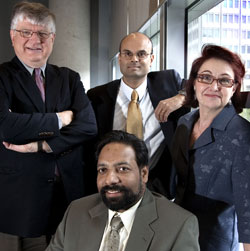Microchip could improve medical tools

Concordia’s Muthu Packirisamy is seated. Behind, left to right, are Jean-Marc Proulx of Valeo Management, Ashok Balakrishnan of the Ottawa-based firm Enablence, and biologist Louise Poulin of CYAD Technologies.
Photo by andrew dobrowolskyj
Muthukumaran Packirisamy and co-inventor Ashok Balakrishnan celebrated the commercialization of their invention in optical MEMS on May 19.
Concordia has a long tradition in MEMS (micro-electro-mechanical systems). This invention adds optical and biological elements to mechanical and electronic ones. Achieving it took 33 agreements, which were managed by the Office of Research and Valeo Manage-ment.
Packirisamy was delighted that the project went from design to prototype testing in 15 intense months. “This project proves that it is possible to fabricate a highly miniaturized and portable device for point-of-care diagnosis and in-situ medical detection,” he said.
“It could have a revolutionary impact on the life sciences through its chemical, biological and medical applications.”
Packirisamy explained that the advantage of packing so many elements into one microchip is that it can be made more robust and less expensive. “A fully integrated platform is very versatile,” he said. “It can be used in medicine; for example, to make disposable blood test instruments that can be self-administered.“
Packirisamy and his colleagues patented their invention and approached Concordia with their idea. The commercial prospects of the invention were recognized by Valeo Management, which began networking for partners.
In 2003, the team received financing of $1.5 million. One-third came to Concordia via a grant obtained by Valeo and supported by Valorisation-Recherche Quebec. The grant was managed by Packirisamy as principal investigator and Ion Stiharu as co-investigator.
The $1 million balance was provided by Enablence Inc., one of two industrial companies in the partnership, to support the development of their portion of the technology platform.
After the initial diligence study by Valeo, the project started in December 2004 with CYAD Technologies and Enablence as collaborating industrial partners with Concordia University.
The objectives were to design and develop a prototype of a microfluidic chip for biological detection through hybrid attachment of a spectrometer on chip. Biologists Louise Poulin and André Darveau of CYAD Tech-nologies contributed significantly to the project.
